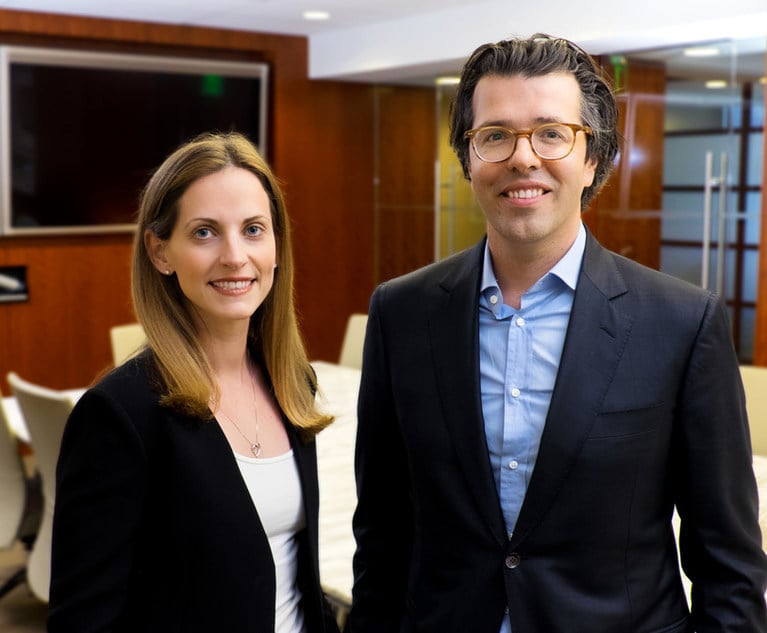Litigator of the Week: Boies Schiller's Dunn Scores in Clash of Tech Titans
Boies Schiller Flexner partner Karen Dunn led a team in scoring a win worth billions to Apple—a key battle in a larger fight against Qualcomm.
March 22, 2019 at 11:35 AM
6 minute read
 Karen Dunn, partner with Boies Schiller Flexner in Washington, D.C., on Wednesday, February 6, 2019.
Karen Dunn, partner with Boies Schiller Flexner in Washington, D.C., on Wednesday, February 6, 2019.
Our Litigator of the Week is Boies Schiller Flexner partner Karen Dunn, who led a team in scoring a win worth billions to Apple. It's one battle in a larger war between the tech giant and Qualcomm—the two companies will face off at trial in San Diego next month—but it's got major implications.
In a summary judgement order, U.S. District Judge Gonzalo Curiel on March 14 ruled that Qualcomm did not have grounds to withhold approximately one billion dollars from Apple, nor was Qualcomm entitled to reimbursement for additional billions of dollars in payments it had made under the agreement.
Dunn discussed the win with Lit Daily.
Lit Daily: Who is your client and what was at stake?
Karen Dunn: I represent Apple. At stake with this summary judgment motion were the terms of a contract between Apple and Qualcomm, public policy considerations emphasizing the importance of responding to law enforcement inquiries, and billions of dollars.
Set the stage—what circumstances led up to this conflict between Apple and Qualcomm?
In 2013, Apple and Qualcomm signed a contract called the Business Cooperation and Patent Agreement (BCPA), which included a gag clause of sorts: Apple was prohibited from actively inducing law enforcement agencies to initiate investigations into Qualcomm's licensing practices that included exhaustion or FRAND claims. But the BCPA also contained a safe harbor allowing Apple to respond to agency inquiries.
The lawsuit between Apple and Qualcomm began when Qualcomm withheld nearly $1 billion under the BCPA while offering to pay the money if Apple recanted its testimony to law enforcement agencies. After Apple sued Qualcomm in January 2017 over this withholding—as well as broader allegations that Qualcomm's licensing practices are anticompetitive—Qualcomm filed counterclaims demanding the return of billions of dollars more in past payments.
How did you come to be involved in the case?
Together with our co-counsel at Fish & Richardson, BSF is litigating the larger case Apple is bringing against Qualcomm, which is set for trial in just a few weeks.
Who is opposing counsel?
Cravath and Quinn Emanuel
What was the issue before Judge Curiel on summary judgment? And how does it fit within the larger suit that's headed for trial next month in San Diego?
The main issue on summary judgment was contract interpretation, and we made a very plain language argument to the court. But there were also very serious public policy considerations.
The key dispute between the parties was whether Apple could freely respond to investigations all around the world into Qualcomm's licensing practices, and we believed Qualcomm's interpretation would have exacted a penalty for cooperating, which is not in the public interest.
The larger antitrust case is very complex, with many moving parts, so this summary judgment ruling narrows the case somewhat—maybe one or two fewer nights at a hotel in San Diego next month.
How did you and your team work together in litigating the case?
The overall case is an example of teamwork at its best, including our co-counsel and client. For this motion, while I had the pleasure of arguing, it was truly a team effort on the briefs—and there were two rounds of briefing.
Bill Isaacson had the idea to bring the motion in the first place and he, Steve Holtzman, Meredith Dearborn, Amy Mauser, Gabe Schlabach and I all had a hand in it. Gabe in particular did stellar work on the briefs and in helping me to prepare for what turned out to be a multi-hour hearing.
Fittingly, when the ruling came down, I was on a plane with bad Wi-Fi (anyone who flies United between California and DC knows what I mean) and only found out we had won when I texted Gabe about slides we needed for a motion in limine argument relating to the BCPA. He texted back, “ok, but are you aware that we won the summary judgment motion?” And I think my texts back to him went something like this: “WHAT? WHAT? WHAT?”
What was your over-arching theme or narrative?
Our overarching theme—apart from the plain language of the contract—was that Apple did the right thing by responding to law enforcement inquiries into Qualcomm's licensing practices. As a general matter, the law works to encourage law enforcement investigations, not thwart them.
What have you found are some effective strategies when working on a huge case like this with multiple moving parts?
Communication. Without exceptional communication, you can lose the forest for the trees or vice versa. The big picture matters and so do the details, and you can't keep your eye on both unless your team is in constant and clear communication.
Tell us about Judge Curiel's decision—any surprises? Parts that stand out as especially significant?
I confess I didn't see coming Judge Curiel's reference to the First Amendment's Petition Clause, but I thought it was fitting. He recognized that the contract's safe harbor allowed Apple the “breathing space” to respond to inquiries much like the Petition Clause provides breathing space for the right to petition.
But my favorite part of the opinion was the following quote, because I think it goes to the heart of the matter: “Apple's responses to FTC inquiries led the FTC to conclude that Qualcomm's conduct violated antitrust laws and led it to file a lawsuit against Qualcomm seeking injunctive relief to protect consumers from ongoing anticompetitive behavior. Clearly, the violations investigated were serious and are alleged to have adversely affected the public. Under these circumstances, enforcing the BCPA so as to punish Apple for responding to regulatory investigations would deter parties from responding to regulatory investigations and have the effect of concealing ongoing illegal conduct to the detriment of the public and perpetuating improper conduct.”
What happens next?
Next we go to trial on April 15!
This content has been archived. It is available through our partners, LexisNexis® and Bloomberg Law.
To view this content, please continue to their sites.
Not a Lexis Subscriber?
Subscribe Now
Not a Bloomberg Law Subscriber?
Subscribe Now
NOT FOR REPRINT
© 2025 ALM Global, LLC, All Rights Reserved. Request academic re-use from www.copyright.com. All other uses, submit a request to [email protected]. For more information visit Asset & Logo Licensing.
You Might Like
View All
Litigator of the Week: Reversing a $2B Trade Secret Verdict, the Largest in Va. History

Litigators of the Week: Irell Duo Lands Another Big West Texas Win, This Time $240M for StreamScale

Litigators of the Week: In Delaware Chancery Trial, Latham Defends Oracle's $9.3B NetSuite Deal
Trending Stories
Who Got The Work
J. Brugh Lower of Gibbons has entered an appearance for industrial equipment supplier Devco Corporation in a pending trademark infringement lawsuit. The suit, accusing the defendant of selling knock-off Graco products, was filed Dec. 18 in New Jersey District Court by Rivkin Radler on behalf of Graco Inc. and Graco Minnesota. The case, assigned to U.S. District Judge Zahid N. Quraishi, is 3:24-cv-11294, Graco Inc. et al v. Devco Corporation.
Who Got The Work
Rebecca Maller-Stein and Kent A. Yalowitz of Arnold & Porter Kaye Scholer have entered their appearances for Hanaco Venture Capital and its executives, Lior Prosor and David Frankel, in a pending securities lawsuit. The action, filed on Dec. 24 in New York Southern District Court by Zell, Aron & Co. on behalf of Goldeneye Advisors, accuses the defendants of negligently and fraudulently managing the plaintiff's $1 million investment. The case, assigned to U.S. District Judge Vernon S. Broderick, is 1:24-cv-09918, Goldeneye Advisors, LLC v. Hanaco Venture Capital, Ltd. et al.
Who Got The Work
Attorneys from A&O Shearman has stepped in as defense counsel for Toronto-Dominion Bank and other defendants in a pending securities class action. The suit, filed Dec. 11 in New York Southern District Court by Bleichmar Fonti & Auld, accuses the defendants of concealing the bank's 'pervasive' deficiencies in regards to its compliance with the Bank Secrecy Act and the quality of its anti-money laundering controls. The case, assigned to U.S. District Judge Arun Subramanian, is 1:24-cv-09445, Gonzalez v. The Toronto-Dominion Bank et al.
Who Got The Work
Crown Castle International, a Pennsylvania company providing shared communications infrastructure, has turned to Luke D. Wolf of Gordon Rees Scully Mansukhani to fend off a pending breach-of-contract lawsuit. The court action, filed Nov. 25 in Michigan Eastern District Court by Hooper Hathaway PC on behalf of The Town Residences LLC, accuses Crown Castle of failing to transfer approximately $30,000 in utility payments from T-Mobile in breach of a roof-top lease and assignment agreement. The case, assigned to U.S. District Judge Susan K. Declercq, is 2:24-cv-13131, The Town Residences LLC v. T-Mobile US, Inc. et al.
Who Got The Work
Wilfred P. Coronato and Daniel M. Schwartz of McCarter & English have stepped in as defense counsel to Electrolux Home Products Inc. in a pending product liability lawsuit. The court action, filed Nov. 26 in New York Eastern District Court by Poulos Lopiccolo PC and Nagel Rice LLP on behalf of David Stern, alleges that the defendant's refrigerators’ drawers and shelving repeatedly break and fall apart within months after purchase. The case, assigned to U.S. District Judge Joan M. Azrack, is 2:24-cv-08204, Stern v. Electrolux Home Products, Inc.
Featured Firms
Law Offices of Gary Martin Hays & Associates, P.C.
(470) 294-1674
Law Offices of Mark E. Salomone
(857) 444-6468
Smith & Hassler
(713) 739-1250







